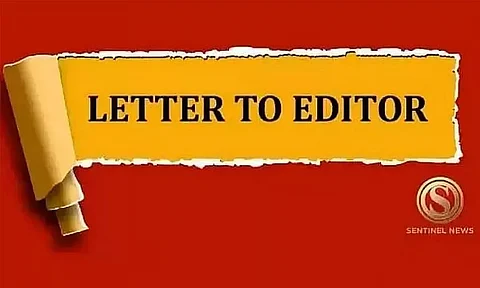
- Home
- Live Blog
- Breaking News
- Top Headlines
- Cities
- NE News
- Sentinel Media
- Sports
- Education
- Jobs

Equitable quota
In the neighbouring state of Meghalaya, members of the three revered indigenous tribes—the Garo, Khasi, and the Jaintia communities—rightfully enjoy the fruits of progressive reservation policies in government employment and collegiate admissions. Regrettably, in Assam, the proud Assamese Kalita and Bamun (Assamese Brahmin) communities find themselves systematically excluded from reservation benefits in both central and state government examinations, as well as government college admissions.
In recent years, there has been a remarkable upsurge in the influx of people from other regions of the country to Guwahati and other flourishing areas of our state for business purposes, along with the omnipresent issue of illegal migration from our state’s southern international borders. As proud custodians of the rich Assamese heritage and culture, we share the same aspirations as communities across the country—that pivotal administrative and law enforcement positions should be entrusted to the indigenous sons and daughters of our beloved soil.
Without the swift implementation of comprehensive and well-structured affirmative action policies, the coming decade or two may witness our future generations locked in fierce competition with non indigenous people for quality educational opportunities and promising employment prospects within the very borders of their ancestral homeland.
The visionary government of Meghalaya recognized this challenge long ago and proactively implemented strategic initiatives to ensure that their three cherished indigenous tribes—the Garo, Khasi, and Jaintia communities—receive preferential consideration for educational advancement and career opportunities within their state boundaries. Across several transformative decades, Assamese people from diverse castes and tribal backgrounds have witnessed a concerning pattern of diminished opportunities in prestigious sectors when compared to their accomplished counterparts from across the nation. The profound and fundamental distinctions between the Kalita and Bamun communities of Assam and the traditionally privileged upper castes from northern and other regions of the country are both striking and significant. The intricate caste dynamics as they unfold in Northeast India diverge remarkably from the conventional patterns observed in other geographical regions.
The representation of Assamese people across all social strata in coveted central government positions such as the IAS and IPS, within the hallowed halls of premier institutions like the IITs and IIMs, or even in the celebrated Indian cricket team, has remained distressingly minimal. The same disheartening narrative, however, cannot be attributed to the upper castes hailing from other flourishing regions of our nation.
The approaching 2026 Assam Legislative Assembly elections herald a pivotal moment of opportunity for the Kalita and Bamun communities to champion their cause for meaningful representation and reservation through appropriate constitutional categories—be it OBC, SC, or ST—while engaging constructively with parties spanning the entire political spectrum. The Assam government’s recent progressive decision to enhance OBC reservations in higher education from 15% to a substantial 27%, coupled with the groundbreaking extension of OBC status to the transgender community, eloquently demonstrates the state’s evolving commitment to expanding comprehensive affirmative action policies.
It is my fervent hope that our esteemed political representatives will also rise to address the deeply legitimate aspirations of all indigenous communities they so proudly claim to champion, thereby ensuring truly equitable opportunities for every historically marginalized segment of our vibrant Assamese society.
Partha Pratim Borah
(parthapratimbora0001@gmail.com)
Time to rethink on EVMs in India
The big news is emerging from the United States, where fresh scrutiny of electronic voting machines (EVMs) is taking shape. The President Donald Trump has claimed that EVMs are vulnerable to fraud and hacking, and expensive too. And have also proposed returning to paper ballots in the mid-term elections to be held in 2026. The countries like Germany, the Netherlands and many others have already discontinued EVM use, citing transparency concerns.
Back home, India must take serious note on the issue. In a recent Supreme Court-supervised recount of the 2022 Haryana Panchayat polls, a losing candidate emerged victorious—exposing flaws in EVM-based counting. In a democracy, even the perception of unfairness undermines public trust. India must seriously evaluate whether EVMs serve or hinder our democratic process. A transparent, verifiable voting method is essential—not just for results, but for public faith in them, and finally, to save democracy.
Prafulla Dowarah,
Guwahati
Mosquito threat
It is often said that the mosquito is the world’s deadliest killer. Mosquito-borne diseases kill more than one million and affect more than seven hundred million every year.In 1897, British doctor Sir Ronald Ross proved the unmistakable link between mosquitoes and malaria. To honour his findings, the “World Mosquito Day” (WMD) is observed on August 20. “Accelerating the fight against malaria for a more equitable world” is the theme for 2025. Malaria is preventable, but susceptible populations must have easy access to disease management.
World Mosquito programme (WMP) is in place in fourteen countries to provide alternatives to time-tested mosquito control measures. But the bigger threat as of now seems to be the dengue fever, with ever-increasing cases in the Western Pacific and SoutheastAsia. WHO has warned about a possible repeat of the Chikungunya epidemic that took a heavy toll two decades ago. Climate change and globalisation have helped fan out mosquito-borne diseases. Innovative methods like the Wolbachia method, where the bacteria is introduced into the Aedes aegypti mosquitoes to reduce their transmission prowess, are being tried.
Dr Ganapathi Bhat
(gbhat13@gmail.com)